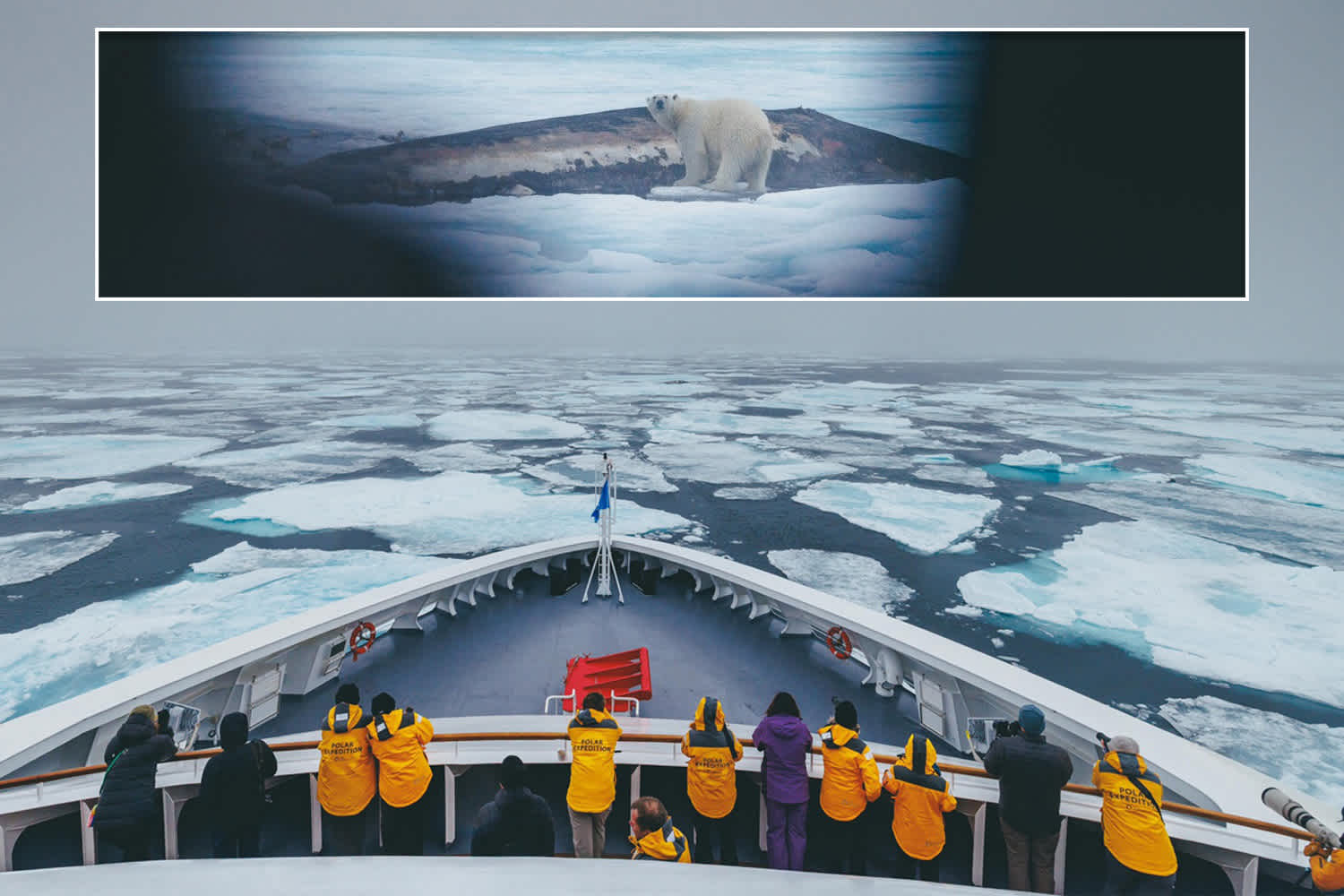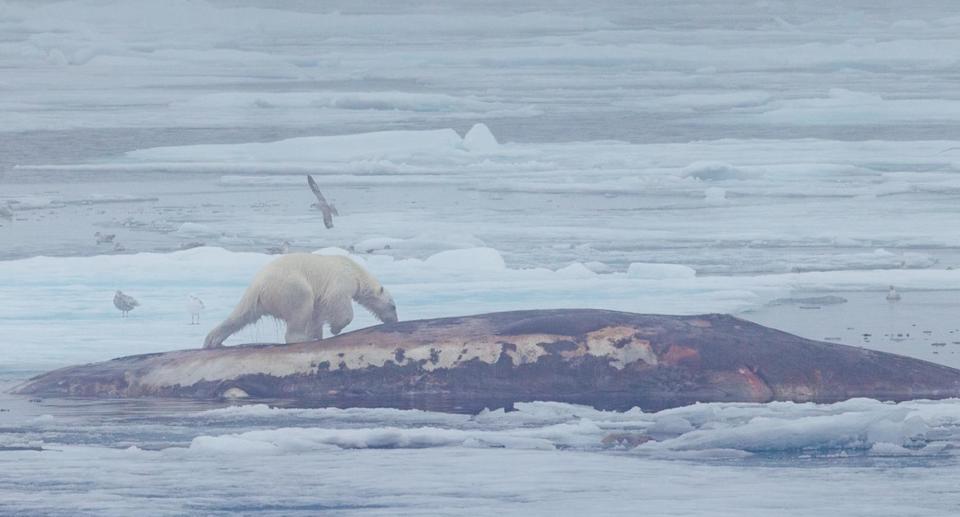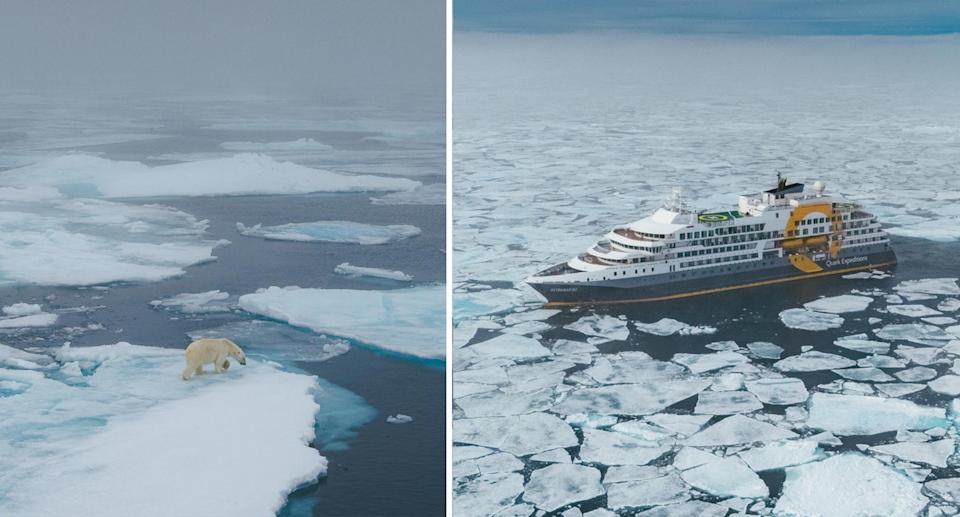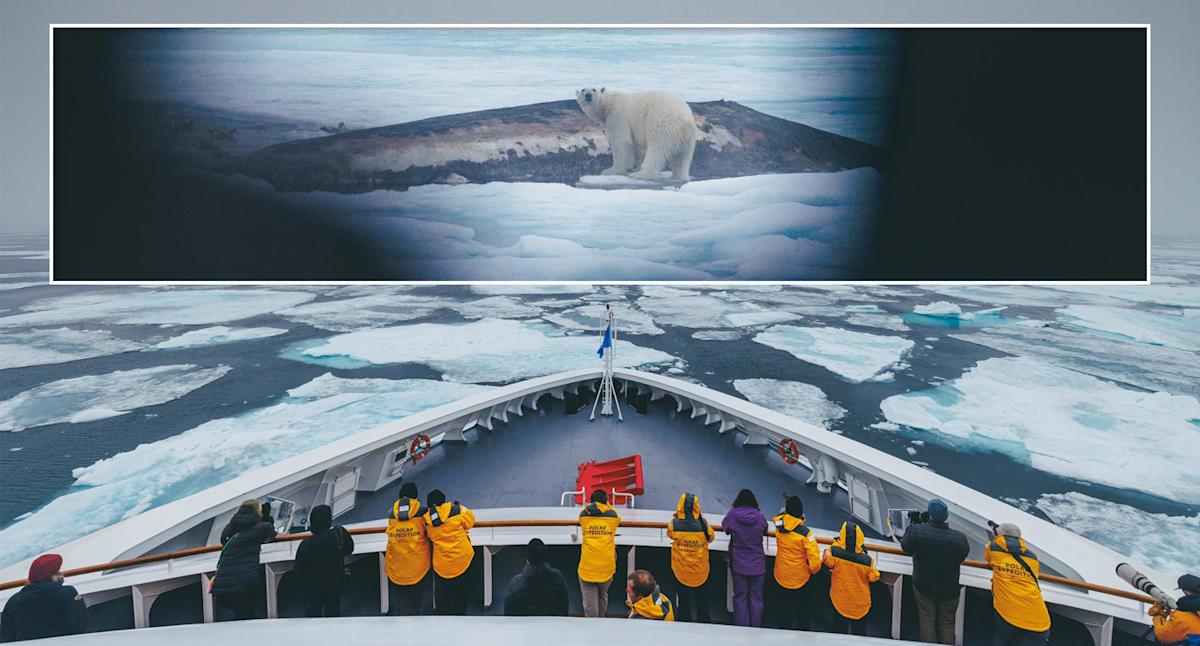 Tourists were stunned to witness polar bears eat a dead whale in the Arctic on July 11. Source: Facebook/Quark Expeditions
Tourists were stunned to witness polar bears eat a dead whale in the Arctic on July 11. Source: Facebook/Quark Expeditions
Surrounded by a frozen and unforgiving landscape, tourists recently watched on as two polar bears picked apart the carcass of a dead whale floating among icebergs in the frigid Arctic.
Stunning images of the “unforgettable moment” were captured from the passenger vessel, with a marine biologist on board telling Yahoo News Australia it was “the best sighting of this kind” in the 18 years he’s worked as a guide.
“Our guests got to witness two bears near a dead whale floating amongst the ice,” marine biologist Mikolaj Golachowski explained. “It was a foggy day, so everything kept coming in and out of view. But then it cleared and we saw a bear (most likely a female) walking close to the ship, heading towards the carcass, then spending about an hour on top of it, feeding.
“After that, she left to disappear into the returning fog… It does happen, but in my 18 years of working as a guide in the Arctic, this was the third and by far the best sighting of this kind. Reasonably close and long.
“That was amazing!” he said.
 Marine biologist Mikolaj Golachowski said the scene was ‘amazing’. Source: Facebook/Quark Expeditions
Marine biologist Mikolaj Golachowski said the scene was ‘amazing’. Source: Facebook/Quark Expeditions
The moment on July 11 was cherished for how special it was, and it’s scenes like this that are seeing more travellers keen to throw some warm clothing into a suitcase and jet off to the ends of the Earth.
As a result, Polar tourism is booming as more and more visitors flock to the once out-of-reach environment. But the trend has raised concerns about the potential costs to the environment.
“Interest in travelling to the Arctic has grown year on year over the last few years,” a spokesperson for Quark Expeditions, a tour company specialising in Arctic and Antarctic travel, told Yahoo News.
While the company focuses primarily on tourism around the North Pole, between 14-16 per cent of people exploring Antarctica with the company are Australians, it said.
Tourists flock to polar regions as ‘sustainability’ is questioned
Both the Arctic and Antarctica are experiencing booms in tourism, and scientists are urging authorities to focus on sustainability as demand skyrockets.
Antarctica
While tourism to Antarctica remains exclusive and very expensive, it has slowly started to grow in popularity. Visitors have increased more than tenfold in the last 30 years, according to data from the International Association of Antarctica Tour Operators.
Unchecked tourism growth in the southern polar region is cause for concern, scientists say. Approximately two-thirds of Antarctic tourists land on the continent, threatening fragile ecosystems there by compacting soils, trampling vegetation, introducing non-native microbes and disturbing breeding colonies of birds and seals.
Darla Hatton MacDonald and Elizabeth Leane, both professors at the University of Tasmania, explained the polar region is already under increased pressure due to climate change, and tourism will only exacerbate the issue, tipping the delicate ecosystems into decline.

Tourism in the Arctic and Antarctica continues to boom. Source: Facebook/Quark Expeditions
The Arctic
In June, United Airlines commenced direct flights from the US to Greenland to accommodate the growing interest in polar explorations. The 2,200-metre runway recently built at Nuuk airport also expands options for tourists eager to travel to the country, without the commitment of flying first to Denmark or Iceland and changing at a remote airport in Kangerlussuaq.
However, cruise ships remain the most popular mode of transport, with tourists heading for the Arctic via Norway. More than 1.5 million cruise passengers visit Norwegian ports every year, according to the Norwegian Coastal Administration.
Elina Hutton, Arctic tourism researcher, said the influx of tourism is damaging sensitive polar ecosystems. She believes Arctic governments need to put tighter controls on cruise ships to restrict the number of visits, throwing into question whether tourism should be embraced, Reuters reports.
“Do we need to be able to travel everywhere? Do we need to be able to fly to Antarctica and cruise to the North Pole? I know it would be fun — but is it something that we need to be able to do?” she said. “It can’t be sustainable.”
Do you have a story tip? Email: newsroomau@yahoonews.com.
You can also follow us on Facebook, Instagram, TikTok, Twitter and YouTube.


